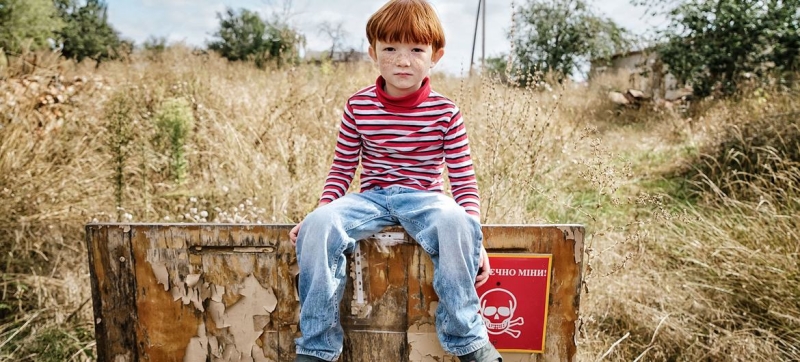
Due to constant power outages, children in Kharkov and the Kharkov region often miss online classes. INTERVIEW | How UNICEF in Kharkov helps families evacuating from areas bordering Russia Humanitarian aid
Amid a rapidly deteriorating security situation in the Kharkov region, UN agencies are helping local authorities evacuate people from areas bordering Russia. The United Nations Children’s Fund (UNICEF) provides support to families with children arriving in Kharkov. Lyudmila Blagonravova asked Lyudmila Palamar, head of UNICEF programs in the Kharkov region, for more information about the situation.
LB: Already almost 2 thousand children in Ukraine were killed or injured as a result of a full-scale Russian invasion. Children also lose their homes, family members, and the war, of course, results in deep psychological trauma. Tell us about the current situation in Kharkov, especially in light of the latest attacks on the city?
LP:Indeed, the situation in Kharkov and the Kharkov region is now difficult. Over the past four days, according to various sources, thousands of people have been evacuated from the northern border regions of the Kharkov region. These are mainly families with children, as well as other categories of the population.
The territories from which evacuation is currently taking place are in a rather difficult situation from a security point of view, These are daily shellings. Therefore, it is now almost impossible for families with children to stay there. Most of them now travel in their own cars and with their own transport. But about 30-40 percent are evacuated centrally.
Those who are evacuated with the help of organizations or local authorities come to the humanitarian headquarters, which is located in the city of Kharkov. The situation in the city itself is now difficult, but much calmer than in the border areas. Shelling of the city continues on a regular basis, but it is not as intense as in settlements such as Volchansk or Liptsy, where people leave.
Po Upon arrival in the city of Kharkov, all evacuees are met by a large humanitarian team at the humanitarian headquarters. UNICEF and our partners are an integral part of this team. We help families with children primarily with essential goods and humanitarian aid. These include hygiene kits, since most families leave in a hurry, they leave with practically nothing, without personal belongings. Therefore, essential goods are what they need in the first days.
We also provide, for example, blankets. We will provide children’s clothing if necessary. We also provide special UNICEF kits that help the child have a better time on the road. This, for example, includes a toothbrush, coloring books, and information materials that help to distract and cheer up the child a little.
Our humanitarian headquarters also works a child-friendly space where professional psychologists organize leisure activities for children while their parents wait in lines to register and receive help.
LB: Recently, critical infrastructure, including energy infrastructure, has often been hit, causing power outages. How does this affect children and, in particular, their ability to receive an education, since many are now forced to study online?
LP:Indeed, the majority of children in the Kharkov region, with the exception of one single school called MetroSchool, which is directly located in the Kharkov metro, absolutely all other schools are now working online. Therefore, all schoolchildren who live in the Kharkov region directly depend on regular access to the Internet and, in fact, to an outlet to charge their laptops or tablets.
For the last few months now, both the city and the entire region have been living in a regime of regular power outages, depending on the locality, and sometimes on the area of the city. Outages can be from several hours a day to, for example, several times for several hours a day.
Of course, this is quite stressful for the children in terms of access to lessons, because all the children live in different areas. Therefore, it is almost impossible for a teacher to adapt, for example, and plan classes in such a way that everyone can join. Therefore, children sometimes drop out of classes, sometimes the lights turn off unexpectedly, for example, and the Internet disappears unexpectedly. So of course this is a big problem.
What we are doing as UNICEF in such a situation to support children and help with their academic performance in war conditions is a program called in English Catch up learning [catching up in studies – editor’s note. ]. The essence of the program is to make up for the knowledge that children have lost or that they have not had time to acquire over the past not only two years of the war, but also over the past four years, since for two more years during the pandemic, Kharkov schoolchildren, like all schoolchildren in the world, there were houses online.
Now in the city of Kharkov we have 10 such locations operating to make up for educational losses. We work in two key subjects within UNICEF’s mandate: literacy and arithmetic, that is, mathematics and language. And in these locations, children can regularly access laptops and activities. These locations are independent of power outages.
We also take the infrastructure component quite seriously, since the latest attacks on infrastructure facilities actually affected not only at critical infrastructure facilities that produce electricity, as well as infrastructure that is responsible for water supply and heating.
And we are now working very closely with utility companies, who are primarily responsible for heating, so that as soon as possible before the start of the heating season, which is actually not that long left, less than six months. We are trying to help them restore or replace the equipment that was lost, so that children in Kharkov and the Kharkov region can start the next winter or even autumn, when the cold weather begins, warm, in their homes and apartments.
Read also:
